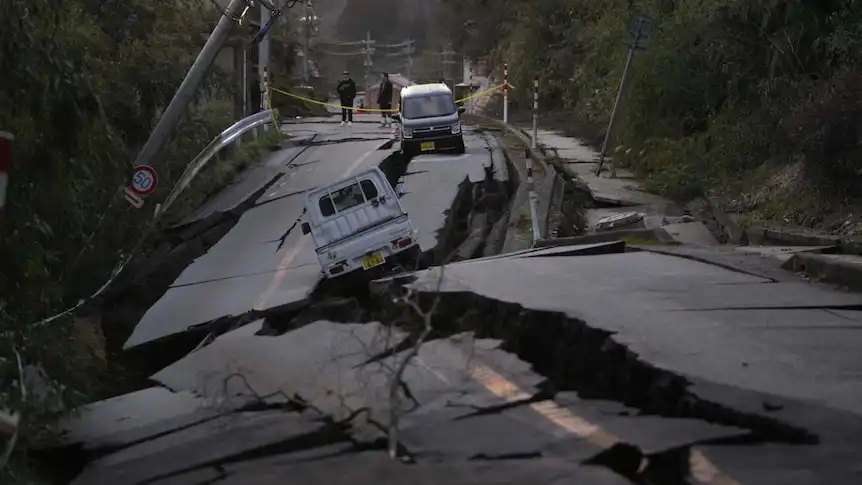Japan earthquake death toll rises to 55 with more shocks predicted
Japan's PM Kishida says the country is in a "battle against time" after a series of major earthquakes hit.
Japan's Prime Minister Fumio Kishida has described the country's current situation as a "battle against time" to rescue those affected by a series of major earthquakes. The largest of the quakes had a magnitude of 7.6 and struck on the west coast of Japan's main island on Monday, shaking buildings in Tokyo, which is around 300km away.
As of now, 55 deaths have been confirmed, all in Ishikawa prefecture, with thousands of buildings, vehicles, and boats damaged. The hardest-hit areas are Suzu and Wajima, another city on the remote northern tip of the Noto peninsula. Since the first quake hit on Monday, around 200 tremors have been detected, and there is a possibility of more strong shocks in the coming days, according to the Japan Meteorological Agency.
The situation was further complicated by a collision between a Coast Guard aircraft en route to deliver aid to the quake-hit region and a Japan Airlines (JAL) airplane at Tokyo's Haneda airport on Tuesday. The JAL Airbus A350 airliner burst into flames, but all 367 passengers and 12 crew members evacuated safely. However, the captain of the Coast Guard aircraft escaped, and five other members died.
The aftermath of the quakes was captured in aerial footage, showing widespread damage in the hardest-hit spots, with landslides burying roads in some areas. The quakes also led to a fire that turned an entire section of Wajima city to ashes.
Despite the widespread destruction, the Japanese people showed resilience and preparedness. Toshitaka Katada, a University of Tokyo professor specializing in disasters, mentioned that people in the area were prepared with evacuation plans and emergency supplies due to previous experiences with quakes. He also said that there are probably no people on Earth who are as disaster-ready as the Japanese.
However, the situation remains precarious and unpredictable, according to both Professor Katada and William Yeck from the USGS Geologic Hazards Science Center. While Japan is a resilient country overall for earthquakes, the unpredictability of such natural disasters means that preparedness is key.
The Japanese government ordered nearly 100,000 people to evacuate their homes on Monday night, sending them to sports halls and school gymnasiums, which are commonly used as evacuation centers in emergencies. Although almost half of those evacuated had returned to their homes on Tuesday after authorities lifted tsunami warnings, around 33,000 households remained without power in Ishikawa prefecture, and weather forecasters predicted rain, raising concerns about crumbling buildings and infrastructure.
Japan is frequently hit by earthquakes due to its location along the "Ring of Fire", an arc of volcanoes and fault lines in the Pacific Basin. This region accounts for about 20% of the world's earthquakes of magnitude-6 or greater and experiences up to 2,000 quakes that can be felt each year.
The pope and several world leaders have sent condolence messages, with US President Joe Biden stating that his country is ready to provide any necessary help to Japan. This is a testament to the global impact of the recent earthquakes in Japan and the urgent need for relief efforts.











Comments on Japan earthquake death toll rises to 55 with more shocks predicted